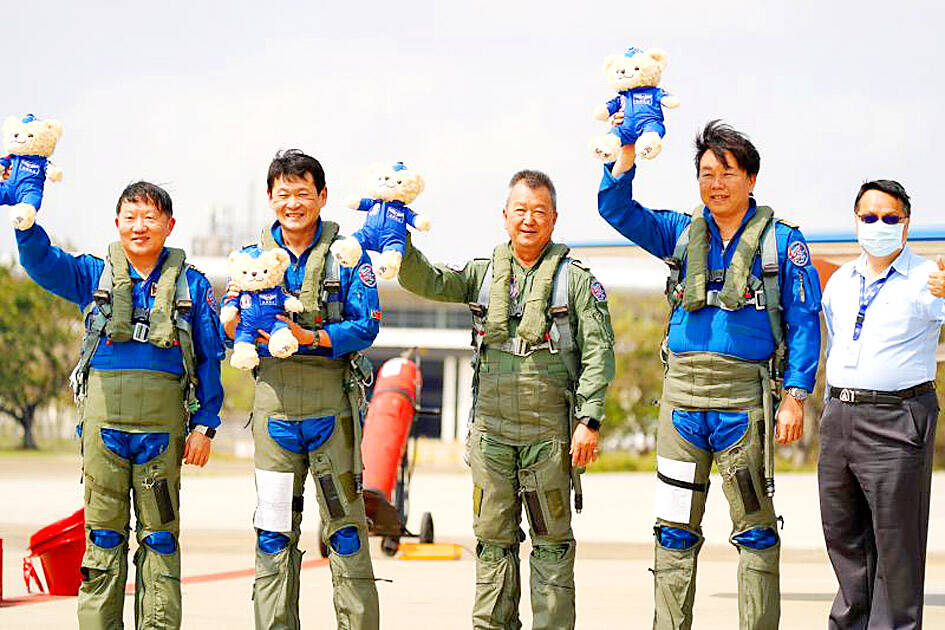Taiwan is seeking US cooperation to make its next domestically developed fighter jet, the head of Taichung-based defense contractor Aerospace Industrial Development Corp (AIDC) said yesterday.
Taiwan’s air force scrambles daily to see off incursions by Chinese jets into airspace near the country, as Beijing steps up pressure on Taipei.
While the mainstay of the air force is Lockheed Martin Corp’s F-16s and French-built Mirages, it also uses AIDC’s F-CK-1 Ching-kuo Indigenous Defense Fighter (IDF).

Photo: Aaron Tu, Taipei Times
The IDF fleet was rolled out more than three decades ago, but has been upgraded.
Speaking at a Taiwan-US defense industry forum in Taipei, AIDC chairman Hu Kai-hung (胡開宏) said the company wanted to raise its technical prowess to help with the development of Taiwan’s next-generation fighter.
“When it comes to the development of the next-generation fighter, we hope the United States supports Taiwan to develop it itself, including the engine, avionics, control systems, environmental controls and so on, which are all an opportunity for Taiwan-US cooperation,” he said.
Taiwan in 2017 announced the next-generation fighter program, to include stealth capabilities, but has given few details since.
Most countries are hesitant to sell weapons to Taiwan for fear of angering China.
Even the US has been unwilling to provide Taiwan its most advanced fighters, such as the F-22 or F-35, and Taiwan has no direct answer to China’s new J-20 stealth fighter.
This has driven Taiwan to develop a new home-built fighter as part of an overall strategy to make more weaponry itself, such as submarines.
“Domestically made aircraft is the road we have to travel,” he said.
AIDC in 2020 test flew a new jet trainer, the AT-5 Brave Eagle, Taiwan’s first jet made domestically since the IDF, and the company is also upgrading the F-16 fleet to the more advanced F-16V version and operates an F-16 maintenance facility.

‘DENIAL DEFENSE’: The US would increase its military presence with uncrewed ships, and submarines, while boosting defense in the Indo-Pacific, a Pete Hegseth memo said The US is reorienting its military strategy to focus primarily on deterring a potential Chinese invasion of Taiwan, a memo signed by US Secretary of Defense Pete Hegseth showed. The memo also called on Taiwan to increase its defense spending. The document, known as the “Interim National Defense Strategic Guidance,” was distributed this month and detailed the national defense plans of US President Donald Trump’s administration, an article in the Washington Post said on Saturday. It outlines how the US can prepare for a potential war with China and defend itself from threats in the “near abroad,” including Greenland and the Panama

A wild live dugong was found in Taiwan for the first time in 88 years, after it was accidentally caught by a fisher’s net on Tuesday in Yilan County’s Fenniaolin (粉鳥林). This is the first sighting of the species in Taiwan since 1937, having already been considered “extinct” in the country and considered as “vulnerable” by the International Union for Conservation of Nature. A fisher surnamed Chen (陳) went to Fenniaolin to collect the fish in his netting, but instead caught a 3m long, 500kg dugong. The fisher released the animal back into the wild, not realizing it was an endangered species at

The High Prosecutors’ Office yesterday withdrew an appeal against the acquittal of a former bank manager 22 years after his death, marking Taiwan’s first instance of prosecutors rendering posthumous justice to a wrongfully convicted defendant. Chu Ching-en (諸慶恩) — formerly a manager at the Taipei branch of BNP Paribas — was in 1999 accused by Weng Mao-chung (翁茂鍾), then-president of Chia Her Industrial Co, of forging a request for a fixed deposit of US$10 million by I-Hwa Industrial Co, a subsidiary of Chia Her, which was used as collateral. Chu was ruled not guilty in the first trial, but was found guilty

DEADLOCK: As the commission is unable to forum a quorum to review license renewal applications, the channel operators are not at fault and can air past their license date The National Communications Commission (NCC) yesterday said that the Public Television Service (PTS) and 36 other television and radio broadcasters could continue airing, despite the commission’s inability to meet a quorum to review their license renewal applications. The licenses of PTS and the other channels are set to expire between this month and June. The National Communications Commission Organization Act (國家通訊傳播委員會組織法) stipulates that the commission must meet the mandated quorum of four to hold a valid meeting. The seven-member commission currently has only three commissioners. “We have informed the channel operators of the progress we have made in reviewing their license renewal applications, and